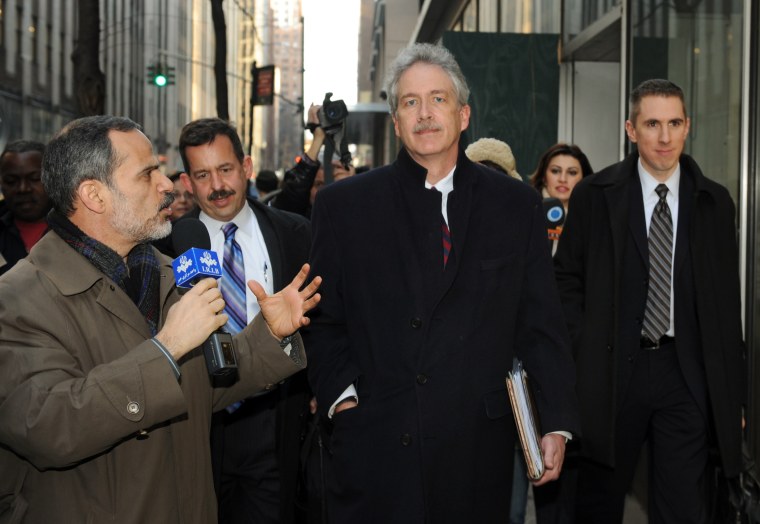Top diplomats from six key powers focused on possible new sanctions against Iran over its nuclear program at a meeting Saturday, but reached no agreement, Russia's deputy foreign minister said.
The Russian official, Sergei Ryabkov said the six powers want to meet again with the Iranians to discuss their October proposal that Tehran exchange uranium for nuclear fuel.
The U.S. was pushing for new sanctions against Iran at Saturday's meeting at the European Union headquarters in New York. Officials from China, Britain, France and Germany also took part in the meeting.
Emerging from the 2 1/2-hour meeting, Ryabkov said: "It is inconclusive in a sense that we didn't make any decisions right away."
He said Russia remains committed to the dual track approach of the six powers — diplomatic and political engagement on the one hand and sanctions on the other.
"We have talked mostly today on the second track, but it doesn't mean that we should abandon the first one," Ryabkov said.
He added that Russia believes there is "still time for meaningful political engagement and efforts to find a solution."
The meeting was supposed to be of political directors — top diplomats in the countries' foreign ministries — but China was only represented by a lower-level diplomat from its U.N. mission, Kang Yong.
Threat of 'consequences'
After weeks of conflicting responses, Iran's Foreign Minister Manochehr Mottaki in mid-December accepted the uranium-for-nuclear fuel exchange proposal "in principle." But in a likely deal breaker, he spoke of exchanging the material in phases rather than all at once as called for in the plan.
U.S. Secretary of State Hillary Clinton said Monday that the Obama administration has concluded that the best way to pressure Iran to come clean on its nuclear ambitions is to impose new sanctions aimed at the country's ruling elite.
U.S. Undersecretary of State William Burns, who attended Saturday's talks, warned ahead of the meeting that Iran would face consequences if it does not comply with the international proposal to limit its uranium enrichment program.
Burns, who was in Moscow for talks with Russian officials on Iran and other issues, said in an interview with the independent Gazeta.ru portal on Thursday that "we will ... need to begin to look at ways in which we can make clear the consequences of not responding constructively."
But with Russia, and especially China, skeptical of any new sanctions, the U.S. and its Western allies have to tread carefully to maintain six power unity on how to deal with Iran.
Taking over the rotating presidency of the Security Council in early January, China's U.N. Ambassador Zhang Yesui said Beijing opposes new sanctions against Iran for now because diplomatic efforts to bridge differences over the country's nuclear program are taking place.
China — which relies on Iran for much of its energy needs — is a veto-wielding member of the Security Council along with the U.S., Russia, Britain and France.
Zhang's opposition means the council almost certainly won't discuss Iran sanctions in January, but whether they may be open to future sanctions talks remains to be seen — and the Western diplomats will almost certainly be looking for clues during Saturday's closed-door talks.
Targeting Iran's elite Guard?
The Security Council has imposed three rounds of sanctions on Iran over suspicions it is hiding nuclear activities and fears that it could retool its enrichment program from making low-grade uranium to produce nuclear power into producing weapons-grade uranium used for nuclear warheads. Iran denies the charge and insists its program is for peaceful purposes.
Under the U.N. plan proposed in October, Iran would ship most of its uranium — up to 2,600 pounds of it — abroad. It would then be enriched to higher levels in Russia, turned into fuel rods in France and returned to power a research reactor in Tehran that produces medical isotopes.
The material in the fuel rods cannot be enriched to higher levels, denying Iran the ability to use it to make weapons.
One well-informed diplomat said recently that the Revolutionary Guard would be a key target of a fourth round of sanctions, but others in Iran's power structure could also be included. Sanctions against companies and organizations controlled by the Revolutionary Guard that have links to weapons proliferation may also be considered, the diplomat said, speaking on condition of anonymity because all talks are going on in private.
The Security Council would likely ban travel and freeze the financial assets of individuals, and freeze the assets of any companies.
